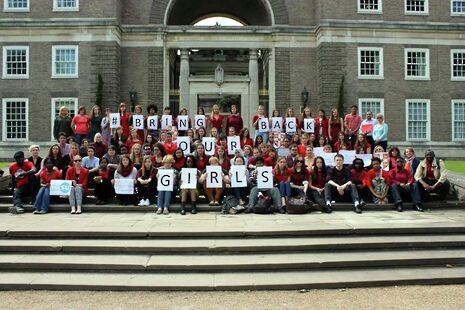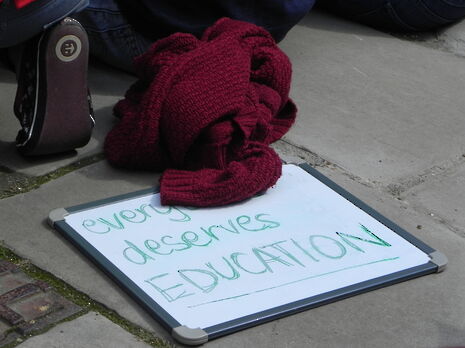Cambridge students proclaim #BringBackOurGirls
CUSU joins hashtag campaign for the release of 276 girls who were abducted in Nigeria by militant group Boko Haram.

Two Nigerian students teamed up with CUSU Women’s Campaign to show support for the girls abducted in Nigeria by the militant group Boko Haram. Babatunde Olaiya and Oluwabukola Gbotosho approached Lauren Steele, the CUSU women’s officer, to ask for help to organise a photo in aid of the #BringBackOurGirls campaign, which has been gaining momentum online and garnering support from people such as Michelle Obama and David Cameron. Lauren commented: “They really wanted […] to show Cambridge students’ solidarity with the people and families in Nigeria – so we joined forces.”

Over 100 students from the university turned up wearing red to promote the cause of over 200 missing Nigerian girls. The initial idea was to take a photo of 276 girls from the University to represent the 276 girls abducted. However, with not enough supporters, the organizers settled for a large group photo with signs proclaiming # BRING BACK OUR GIRLS. Individual photos were also taken with students holding up boards and papers with their own personal messages such as “I am just like them” and “Education is for everyone.”
Both male and female students took time out from studying to get involved. One girl even rearranged a supervision just to be able to make it. Another student wanted to be involved because “it's a good opportunity to do what you can for the cause. I mean, what else is there to do in exam term?”
Oluwabukola said that they had approached CUSU “wanting to use it as a platform because we didn’t want this to just be a Nigerian problem.” Babatunde agreed: “The most important thing is to show solidarity. These girls have already had to overcome so much adversity just to go to school. They should not be punished for that.” He also talked about the “ripple effect” as “the activities of the Boko Haram group has a wider ramification for the state of education in Northern Nigeria”.
Hashtag Twitter campaigns have been used in the past to bring international attention to issues. The effectiveness of hashtag campaigns has been questioned recently but Lauren believes this social media approach can make a difference: “They are extremely effective in showing the stance of the global community as well as spurring the international community into action.”
Along with the photos and statements of support, Babatunde and Oluwabukola have written a letter showing their “solidarity with the global movement against the activities of the notorious Boko Haram terrorist group, which has claimed responsibility for [this] dastardly act, and to condemn the unsatisfactory manner in which the authorities in Nigeria have handled the situation. They also call upon “the authorities in Nigeria, relevant international organizations and friendly governments to work in concert to ensure that the state of affairs is resolved in favour of the full restoration of sustainable peace, security and good governance in that region of Nigeria.”
 News / Cambridge University disables comments following Passover post backlash 24 April 2024
News / Cambridge University disables comments following Passover post backlash 24 April 2024 Comment / Gown vs town? Local investment plans must remember Cambridge is not just a university24 April 2024
Comment / Gown vs town? Local investment plans must remember Cambridge is not just a university24 April 2024 News / Fitz students face ‘massive invasion of privacy’ over messy rooms23 April 2024
News / Fitz students face ‘massive invasion of privacy’ over messy rooms23 April 2024 Interviews / Gender Agenda on building feminist solidarity in Cambridge24 April 2024
Interviews / Gender Agenda on building feminist solidarity in Cambridge24 April 2024 Comment / Does Lucy Cavendish need a billionaire bailout?22 April 2024
Comment / Does Lucy Cavendish need a billionaire bailout?22 April 2024





